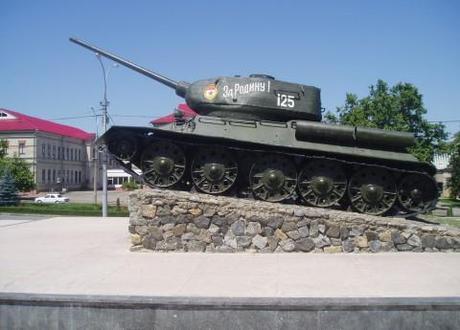
A tank memorial in Transnistria. photo: Guttorm Flatabø
This post first appeared at New Eastern Europe.
Some have called him the Obama of Transnistria, Moldova’s breakaway republic. He has youthful looks and a change-fueled campaign propelled him to an upset election victory over incumbent President Igor Smirnov, a 20-year strongman, and a Moscow-endorsed candidate with corporate ties.
But in an interview earlier this month, Yevgeny Shevchuk’s message was pure Clinton. On the prospects for conflict negotiations, democracy in the quasi-state, his attitude toward the West, the answer stays the same: It’s the economy, stupid.
Transnistria, also known as Trans-Dniester, is a slim strip of a separatist region sandwiched between Moldova and Ukraine; the international community does not recognize its independence and it is locked in a standoff with Moldova.
We met Shevchuk in his newly repurposed presidential offices, the lavish marble former headquarters of the State Customs Committee – an unaccountably lucrative enterprise under the leadership of the former president’s son. It seemed as good a place as any to bring up Transnistria’s reputation in the West for dangerous trafficking.
Shevchuk did not deny that smugglers operate in Transnistria, but blamed his country’s tarnished reputation primarily on black public relations coming from Moldova. He also suggested corruption in the region is far from a uniquely Transnistrian problem.
“We’re between Moldova and Ukraine. They control their own borders,” Shevchuk said. “When Moldovan authorities throw around political slurs about smuggling, perhaps they’re also referring to themselves.”
When we asked how he planned to bring members of the previous administration to account for corruption, Shevchuk reaffirmed a key campaign issue – under his watch all Transnistrians will stand equal in the eyes of the law. He intends to reorganize the security services and establish long-term programs to raise the morale of public workers to fight corruption.
“We want to develop a stable state that can cast off all the clichés that have arisen in recent years,” Shevchuk said. “We want Transnistria to be seen as a stable member of the international community.”
“We want Transnistria to be seen as a stable member of the international community.”
On the ongoing talks to resolve the so-called frozen conflict with Moldova, Shevchuk balked at use of the word “negotiation” to describe the first meeting during Shevchuk’s presidency, held in Dublin at the ministerial level.
“If we don’t have equality between the two sides, it’s not a negotiation,” Shevchuk said. Unless the Moldovan side was ready to recognize Transnistria as an equal partner in the negotiations, he doubts progress will be forthcoming at talks scheduled for April in Vienna.
Shevchuk expressed his appreciation for the international format of negotiations, adding that he feels a cautious optimism. He stressed that Transnistria’s economy is his top priority, suggesting that working together on improving economies could form better trust between the negotiating partners.
Conversely, Shevchuk described Moldovan trade policies, supported by the EU, as designed to “instigate poverty” in the industrially rich region and “fundamentally anti-democratic,” warning that if the economy continued to be stunted artificially from outside, “the situation could deteriorate to the point that it makes no sense to continue negotiations.”
Shevchuk also hinted at his willingness to adopt a pragmatic relationship with the West.
“Since Romania joined the European Union, the West is practically our neighbor. We’re interested in economic cooperation with EU member states.” Starting with the assumption that the West is always right and Transnistria always wrong, however, will not work.
“We’re not asking for handouts. But our citizens have a right to 21st-century standards of living.”
Still, Shevchuk admits that recent meetings with Western officials have shown the beginnings of an improved relationship. He emphasized he is willing to look both East and West to solve “the human problems resulting from 20 years of international non-recognition.”
“Democratic transformation here should be based on extending economic opportunities, not poverty. We’re not asking for handouts. But our citizens have a right to 21st-century standards of living.”
William Schreiber has written about Central and Eastern Europe for Newsweek, the Wall Street Journal and other regional publications. Currently, he works at the Permanent Secretariat of Community of Democracies in Warsaw, and serves on the board of directors of the American Polish Advisory Council. Schreiber is co-editor and author of Moldova: Arena of International Influences (Lexington Books, 2012).
Marcin Kosienkowski, PhD, is assistant professor at the Institute of Political Science of the John Paul II Catholic University of Lublin, Poland. His research focuses on the post-Soviet area, mainly Moldova and its breakaway region of Transnistria. Kosienkowski is co-editor and author of Moldova: Arena of International Influences (Lexington Books, 2012).

